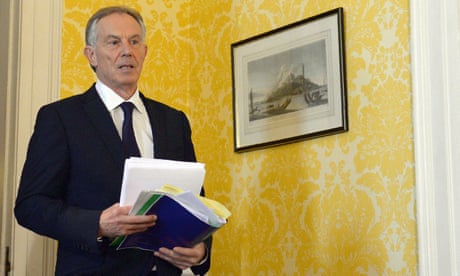Patrick Wintour
July 7, 2016
Intelligence files support claims Iraq invasion helped spawn Isis
Allegations that the invasion of Iraq increased the terrorist threat to the UK and helped spawn the terror group Islamic State are supported by intelligence documents released as part of the Chilcot report.
Top-secret reports from the joint intelligence committee, some of which were released for the first time, make clear security services’ concern about the increasing power inIraq of jihadi groups, some of which were linked directly to al-Qaida.
The JIC documents challenge a claim made by Tony Blair that Isis was largely born in Syria rather than Iraq.
The reports show that by 2006 the British security services had become worried that Sunni jihadi groups had started to dominate the insurgency against the Shia-led Iraqi government of Nouri al-Maliki.
One JIC report dated March 2007 states: “There is no shortage of suicide bombers. AQ-I [al-Qaida in Iraq] is seeking high-profile attacks. We judge AQ-I will try to expand its sectarian campaign wherever it can: suicide bombings in Kirkuk have risen sharply since October when AQ-I declared the establishment of the notional ‘Islamic State of Iraq’ (including Kirkuk).”
It continues: “A number of Sunni groups are involved in sectarian attacks, but we judge AQ-I is in the vanguard … Its strategic main effort is the prosecution of a sectarian campaign designed to drag Iraq into civil war. We judge its campaign has been the most effective of any insurgent group, having significant impact in the past year, and poses the greatest immediate threat to stability in Iraq. The tempo of mass-casualty attacks on predominantly Shia targets has been relentless.”
An earlier July 2006 JIC report states: “The label ‘jihadist’ is becoming increasingly difficult to define: in many cases distinctions between nationalists and jihadists are blurred. They increasingly share common cause being drawn together in the face of Shia sectarian violence.”
It adds: “We judge al-Qaida in Iraq (AQ-I) is the largest single insurgent network and although its leadership retains a strong foreign element, a large majority of its fighters are Iraqi. Their motivation is mixed: some are Islamist extremists inspired by the AQ agenda, others are simply hired hands attracted by the money. Some are drawn in by the opportunity to take on Shia militias: the jihadists’ media effort stresses their role as defenders of the Sunni.”
The report gives credence to those who claim that Blair was given ample warning that the removal of Saddam Hussein might uncork sectarian tensions suppressed by Saddam’s brutal rule.
Eliza Manningham-Buller, the head of MI5 from 2002 to 2007 told the inquiry: “By 2003/4 we were receiving an increasing number of leads to terrorist activity from within the UK … our involvement in Iraq radicalised, for want of a better word … a few among a generation … [who] saw our involvement in Iraq, on top of our involvement in Afghanistan, as being an attack on Islam.”
Asked whether the judgment that the effect of the invasion of Iraq had increased the terrorist threat to the UK was based on hard evidence or a broader assessment, Lady Manningham-Buller replied: “I think we can produce evidence because of the numerical evidence of the number of plots, the number of leads, the number of people identified, and the correlation of that to Iraq and statements of people as to why they were involved … So I think the answer to your … question: yes.”

Blair said he had read the JIC assessment of February 2002 that action in Iraq would increase the al-Qaida threat to the UK, but believed that “to have backed down because of the threat of terrorism would be completely wrong. In any event, following 9/11 and Afghanistan we were a terrorist target and, as recent events in Europe and the US show, irrespective of Iraq there are ample justifications such terrorists will use as excuses for terrorism.”
Warnings were made by the French, whose then president, Jacques Chirac, was vehemently opposed to the invasion, that the outcome was highly unpredictable.
Giles Paxman, deputy head of mission at the British embassy in Paris, discussed UK thinking on post-Saddam Iraq with two senior French officials on 16 October 2002. One official was reported to have commented that he “feared that the removal of Saddam would lead to general anarchy in Iraq with attacks on Ba’ath party symbols, settling of accounts and widespread violence as in Albania.”
In December that year Simon Fraser, the Foreign Office’s director for strategy and innovation, reported that a French interlocutor had “argued that we needed to think carefully about the potential for political disintegration in Iraq after a war. There could be many unforeseen consequences including political instability motivated by revenge. We should not let the optimistic scenarios blind us to the potential problems. The same went for the wider regional implications.”
Voices in the Foreign Office concurred. A memo dated January 2003 warned: “All the evidence from the region suggests that coalition forces will not be seen as liberators for long, if at all. Our motives are regarded with huge suspicion. The Iraqis, including those in exile, (and the Arabs more generally) want us gone quickly. Our occupation and administration of Iraq will become more unpopular and its lawfulness more debatable the longer it continues.”
No comments:
Post a Comment